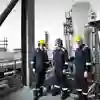




Want to be a future leader in the chemical and process industry? Our MSc in Advanced Chemical Engineering is designed for you.
You’ll develop advanced skills to engineer solutions to global challenges such as alternatives to fossil fuels, recycling, oil and gas refinery and waste and water treatments.
We’re in a region with a high concentration of process industry companies. So you’ll be learning close to industry giants with businesses such as BP, Total, Phillips 66, Smith & Nephew, Reckitt, INEOS, Centrica Storage, Croda and many more right on our doorstep.
About this course
Progress your technical career in the chemical and process industry with this MSc.
You’ll study advanced chemical engineering areas such as process safety and control, nanomaterials, energy generation from renewable resources and process modelling and simulation. And enhance your critical thinking skills and specialist knowledge to address global challenges in the field of chemical engineering.
Our strong relationships within the sector ensures we teach the most up-to-date and relevant skills the industry needs. They also give you the chance to gain insight from guest speakers in the field. Be trained in process safety training by industry experts. And experience site visits within our region’s thriving chemical and process sector.
You’ll develop competence and confidence in applying engineering knowledge and techniques to a range of industrial problems. Working with industry-standard software such as Aspen Hysys, MATLAB, Ansys and COMSOL, you’ll build digital skills. Our virtual control room gives you the chance to practice working across chemical plant processes and operations. And, supported by a member of our expert team, you’ll also complete a research project of your choice.

MSc Advanced Chemical Engineering
2 mins
Module options
For a full Masters degree, you'll study 180 credits over the duration of your course. Some programmes offer a Postgraduate Diploma (PGDip) qualification or a Postgraduate Certificate (PGCert) qualification. For a PGDip, you'll study 120 credits, and for a PGCert, you'll study 60 credits.
Filters
MSc Project (Chemical Engineering)
This module gives you the opportunity to carry out a research project on an advanced chemical engineering-related topic. It allows you to gain knowledge and develop research skills in areas that are of utmost importance in our current time, such as the decarbonisation of chemical industries. The course also provides the opportunity to sharpen your time management, communication, and presentation skills.
core
60 credits
Advanced Process Safety, Industrial Process Control and Instrumentation
The module aims to develop and enhance a range of professional skills as a basis for professional registration as an Incorporated or Chartered Engineer. In particular, it aims to expand upon the distinct, though related, topics of process safety and builds upon the material that has been presented in lower programme stages.
Students will be the opportunity to explore how Process Safety manages the integrity of operating systems by applying inherently safer design principles, effective engineering and disciplined operating practices. It deals with the prevention and mitigation of incidents that have the potential for a loss of control of a hazardous material or energy
core
20 credits
Project Management and Research Skills
This module introduces you to a structured approach to planning/bidding, managing and controlling a project. You'll explore current practices, topics and methodologies relevant to contract and project management. You'll develop research skills for designing, planning and conducting an academic or industry-based engineering project.
compulsory
20 credits
Advanced Process Modelling and Simulation Techniques
This module delivers advanced skills in digital Chemical Engineering, providing in-depth coverage of topics including dynamic and steady state process simulations at the macro level, alongside process optimization and analysis (technical, energy and economic) using Aspen HYSYS.
optional
20 credits
Petroleum and Gas Engineering for Energy and Chemical Feedstock
The oil industry is continuously developing and is therefore both recognised and expected to remain a major contributor to the economies of many developed and developing countries. You will develop insights into the petroleum and petrochemical engineering sector, with respect to their practical application to chemical engineering process analysis and design. You will utilise Aspen HYSYS applications to explore practical crude oil refinery processes such as oil characterisation, desalting, blending, preheating, distillation and optimisation.
optional
20 credits
Energy Generation from Conventional and Renewable Fuels
You will be introduced to the core technical and socio-economic (sustainability) aspects determining optimum engineering, the selection criteria for low carbon energy generation routes and technologies applicable around the world. This includes a range of solid, liquid and gaseous fuels, fuel processing technologies including, but not limited to; clean coal, gas, biomass and waste. You will also by acquire invaluable soft engineering skills for your future career.
optional
20 credits
Computational Fluid Dynamics and Heat Transfer
Computational Fluid Dynamics (CFD) has grown from a mathematical curiosity to become an essential tool in almost every branch of fluid dynamics, from aerospace propulsion to weather prediction. CFD applications are now widely utilised within industry, with a considerable demand for specialists in the subject. This module will give you an opportunity to get hands-on experience with a major commercial CFD package and to demonstrate your skills for a practical engineering application.
optional
20 credits
Advanced Process Engineering
With the electrification of chemical manufacturing and the deployment of critical minerals needed for both the energy and digital transitions, this module covers electrochemical and mineral process engineering, with industrial relevance highlighted.
optional
20 credits
Energy Technologies
This module will introduce you to a broad range of renewable and conventional energy sources. Given the importance of energy supply in both developed and developing economies, this module will provide an overview of the main renewable and conventional technologies, the principles of energy conversion, distribution and storage methods suitable for these technologies.
optional
20 credits
Our academics
We pride ourselves on the friendly, supportive atmosphere we create for our students.
Our open-door policy makes it easier for you to speak to your lecturers and get help with your studies. Your personal supervisor is your main point of contact, and there to help you throughout your course.

Dr Carolina Font Palma
Senior Lecturer in Mechanical Engineering
Dr Font Palma is Lecturer and Programme Director of Chemical Engineering. Carolina was awarded the prestigious RAEng/The Leverhulme Trust Research Fellowship 2020/2021.

Dr Sharif Zein
Reader in Chemical Engineering
Entry Requirements
What do I need?
When it comes to applying for this Postgraduate Taught degree, you'll need an Undergraduate degree (or equivalent). For this course, you'll need a 2:2 from a relevant bachelor's degree.
The programme is designed for graduates who have a studied a subject that is relevant to this course.
If you’re an undergraduate student at Hull, you’re guaranteed a fast-track route to this postgraduate degree, as long as you meet the entry requirements.
In order to ensure our students have a rich learning and student experience, most of our programmes have a mix of domestic and international students. We reserve the right to close applications early to either group if application volumes suggest that this blend cannot be achieved.
Typical offer
2:2 in a relevant subject area
Applicants should hold a Bachelor Honours degree at 2.2 level or above (or international equivalent) in Chemical Engineering, or a closely related subject.
Fees & Funding
How much is it?
Tuition fees for 2027 entry have not been confirmed. Please use 2026-27 information as a guide.
Scholarships
We offer a number of awards, bursaries and scholarships for eligible students. They’re awarded for a variety of reasons including academic achievement and/or to help those on lower incomes.
Scholarships and bursaries are separate to student loans. And the best bit is, you don’t pay a penny back.
Alumni Postgraduate Scholarship
University of Hull undergraduates progressing to a taught masters course may receive a 20% discount on the cost of their tuition fees.
Find out if you’re eligible by visiting the University of Hull Alumni Postgraduate Scholarship page.
See more Scholarships
We offer a range of scholarships and awards to students at the university to help with their financial load.
To view all of our scholarships and determine whether you're eligible, please visit our Scholarships and Awards page.
Our facilities

Future prospects
The chemical engineering industry is expanding rapidly, meaning employment opportunities are high.
Alongside technical know-how you’ll also build valuable critical thinking, communication, problem-solving and independent research skills throughout your degree.
You could go on to a PHD or roles such as engineer, manager or field supervisor – working to manage projects, develop products or improve processes. The range of sectors you could work in is broad and varied with examples including energy, environment, sustainability, waste and water treatment, food production, chemical products, pharmaceuticals, biotechnology and consultancy and management.
Take your career to the next level
Like what you’ve seen? Then it’s time to apply.
Make your application online now, and our admissions team will get back to you as soon as possible to make you an offer.
Not ready to apply yet?
We regularly deliver virtual and on-campus events to help you discover your perfect postgraduate course, whether it’s a subject you already love or something completely different. Our events are an opportunity for you to chat to tutors and current students and find out about the career options a postgraduate degree could lead to.